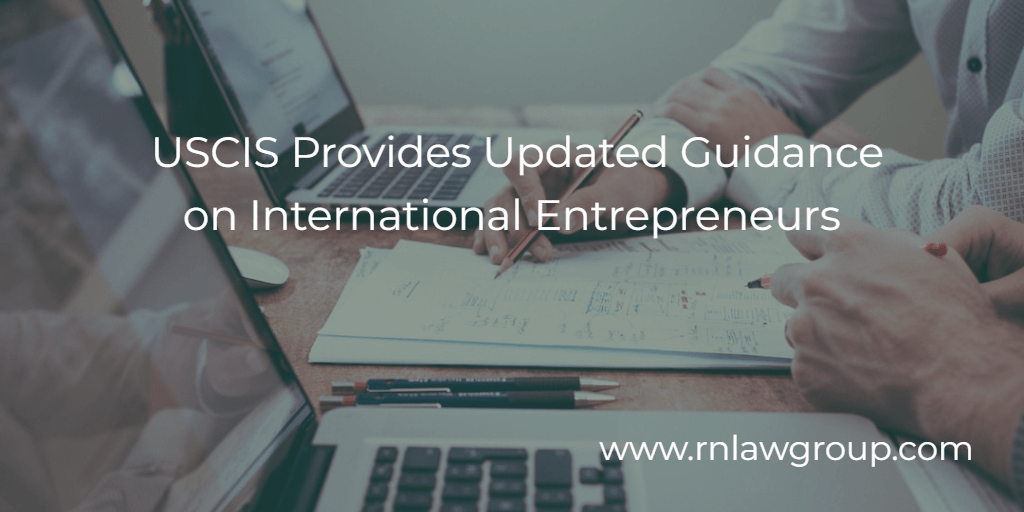
USCIS Provides Updated Guidance on International Entrepreneurs
In 2017, in order to increase entrepreneurship, innovation, and job creation in the United States, Department of Homeland Security (DHS) published a final rule titled the International Entrepreneur Rule. The Reddy Neumann Brown PC team has put together previous articles on this regulation and the program: here and here. In 2018, the Trump Administration proposed a regulation to rescind the International Entrepreneur Regulation. However, this proposed regulation was withdrawn in May 2021, and the program was “reaffirmed.” Unfortunately, because of the state of uncertainty, there were very few investors that sought to utilize this program. On March 10, 2023, USCIS published new policy guidance on the International Entrepreneur Parole program that should provide more clarity on the program.
What is International Entrepreneur Parole?
The International Entrepreneur Parole rule allows DHS to grant a period of authorized stay to entrepreneurs who possess a substantial ownership interest in a start-up entity and who can demonstrate that their stay in the United States would provide a significant public benefit through the entity’s ability for rapid growth and job creation. Applicants would file an Application for Entrepreneur Parole on a Form I-941 with USCIS and pay the necessary filing fees. Notably, even though this is parole, applicants can be in the US to apply, but would have to depart the US and appear at a port of entry after approval.
International Entrepreneur Parole Basics
Investors must show a few key elements to qualify for the International Entrepreneur Parole. First, they have to have a “central and active role” in the operations of the start-up entity. Next, the investor must have a “substantial ownership interest.” USCIS considers 10% to be the minimum for “substantial ownership interest,” and this can be reduced after the granting of the initial parole, but must be at least 5%. Further, no more than three entrepreneurs may be granted parole based on the same entity.
The start-up also must meet certain requirements. The entity must be:
- A corporation, limited liability company, partnership, or other entity that is organized under federal law or the laws of any state, and that conducts business in the United States;
- Not primarily engaged in the offer, purchase, sale or trading of securities, futures contracts, derivatives, or similar instruments;
- Formed within the 5 years immediately preceding the date the applicant filed the initial parole application and lawfully doing business during any period of operation since its date of formation; and
- An entity with substantial potential for rapid growth and job creation.
What is the Investment Amount for the International Entrepreneur Parole Program?
In order to qualify for International Entrepreneur Parole, an investor must show potential for rapid growth and job creation. This can be done if the investor can show that within 18 months prior to filing the I-941, the investor(s) made qualified investments in the required amount. While the amount automatically adjusts every 3 years based on the Consumer Price Index for All Urban Consumers, the current amounts are as follows:
- If filing before October 1, 2021: $250,000
- If filing on or after October 1, 2021: $264,147
Who is a Qualified Investor for the International Entrepreneur Parole Program?
A qualified investor is an individual who is a U.S. citizen or lawful permanent resident (LPR) of the United States, or an organization that is located in the United States and operates through a legal entity organized under the laws of the United States or any state, that is majority owned and controlled, directly and indirectly, by U.S. citizens or LPRs of the United States. Note, the investment amount does not include any investment, directly or indirectly from:
- The entrepreneur;
- The parents, spouse, brother, sister, son, or daughter of the entrepreneur; or
- Any business entity in which the entrepreneur or one of such relatives has any ownership interest.
In essence, the investment must be that, an investment from an investor, not from the entrepreneur or their family. This does not prevent the entrepreneur from investing in the business, but the entrepreneur’s investment will not be counted towards the amount required for the program.
Further requirements are placed on the investor. They must show that they regularly make investments into start-up entities. This can be done by showing that during the preceding five years that:
- The qualified investor made investments in start-up entities in exchange for equity, convertible debt, or other security convertible into equity commonly used in financing transactions within their respective industries comprising a total in such 5-year period of no less than the investment amount in the chart below; and
- Subsequent to such investment by such individual or organization, at least two such entities each either created at least five qualified jobs or generated revenue of at least the amount of $633,952 investment and annualized revenue growth of at least 20 percent.
USCIS Updates to the International Entrepreneurial Parole Program
As part of the March 10, 2023 policy changes, USCIS has updated its policy manual. The changes can be found throughout Volume 3, Humanitarian Protection and Parole and USCIS has added Part G, International Entrepreneur Parole. This is important as it provides guidance to adjudicators and can used by the public to properly prepare International Entrepreneurial Parole Program applications. Specifically, USCIS’s policy change has the following:
- Provides comprehensive guidance on the criteria for consideration and related definitions for the applicant, the start-up entity, and the qualified investment, grant, or award, as well as relevant evidence that may be submitted.
- Provides guidance pertaining to the adjudication of applications for entrepreneur parole.
- Explains the discretionary nature of the entrepreneur parole adjudication.
- Provides the conditions on parole and bases for termination and explains the criteria to be considered for an additional parole period.
- Clarifies the application process for the entrepreneur’s family, including the ability of the entrepreneur’s spouse to apply for authorization to work after being paroled into the United States.
If you are interested in seeking international entrepreneurial parole, you should speak to a qualified immigration attorney. The Reddy Neumann Brown PC team has been keeping up with the rule since its introduction and is ready to assist businesses seeking to utilize this program.
As one of the largest employment-based immigration law firms in Houston, Texas, our team is committed to assisting investors in navigating the complex International Entrepreneur Parole program in order to assist them throughout their immigration journey.
Reddy Neumann Brown PC has been serving the business community for over 25 years and is Houston’s largest immigration law firm focused solely on U.S. Employment-based immigration. We work with both employers and their employees, helping them navigate the immigration process quickly and cost-effectively.
By: Steven Brown
Steven Brown is a Partner at Reddy Neumann Brown PC where he works in the Non-immigrant visa department and leads the Litigation Team. His practice covers all phases of the non-immigration visa process including filing H-1B, L-1, E-3, H-4, and H-4 EAD petitions. In the last two years, Steven has successfully handled over 1,000 non-immigrant visa petitions including filing petitions, responding to any necessary Requests for Evidence, and drafting motions and appeals. He has also become a key resource for F-1 students that seek guidance on properly complying with the F-1 visa regulations and any OPT or CPT issues they may have. Additionally, Steven holds a weekly conference call for companies that are part of one of the largest organizations for IT Services companies in America.

